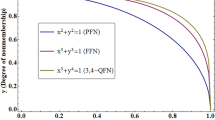Abstract
The paper concerns designing relational neuro-fuzzy systems as a multicriteria optimization problem. Relational neuro-fuzzy systems have additional relation making rules to have more flexible form. A method for designing neuro-fuzzy systems by using information criteria and criteria isolines is used to find the optimal relational system for a given problem.
This work was supported in part by the Foundation for Polish Science (Professorial Grant 2005-2008) and the Polish State Committee for Scientific Research (Grant Nr T11C 04827).
Preview
Unable to display preview. Download preview PDF.
Similar content being viewed by others
References
Babuska, R.: Fuzzy Modeling For Control. Kluwer Academic Press, Boston (1998)
Blake, C.L., Merz, C.J.: UCI Repository of machine learning databases. University of California, Department of Information and Computer Science (1998), http://www.ics.uci.edu/~mlearn/MLRepository.html+
Branco, P.J.C., Dente, J.A.: A Fuzzy Relational identification Algorithm and its Application to Predict the Behaviour of a Motor Drive System. Fuzzy Sets and Systems 109, 343–354 (2000)
Cpałka, K.: A Flexible Connectionist System. In: Wyrzykowski, R., Dongarra, J., Paprzycki, M., Waśniewski, J. (eds.) PPAM 2004. LNCS, vol. 3019, pp. 618–625. Springer, Heidelberg (2004)
Jang, R.J.-S., Sun, C.-T., Mizutani, E.: Neuro-Fuzzy and Soft Computing. A Computational Approach to Learning and Machine Intelligence. Prentice Hall, Upper Saddle River (1997)
Nauck, D., Klawon, F., Kruse, R.: Foundations of Neuro-Fuzzy Systems. John Wiley, Chichester (1997)
Nowicki, R., Pokropińska, A.: Information Criterions Applied to Neuro-Fuzzy Architectures Design. In: Rutkowski, L., Siekmann, J.H., Tadeusiewicz, R., Zadeh, L.A. (eds.) ICAISC 2004. LNCS (LNAI), vol. 3070, pp. 332–337. Springer, Heidelberg (2004)
Pedrycz, W.: Fuzzy Control and Fuzzy Systems. Research Studies Press, London (1989)
Rutkowski, L., Cpałka, K.: Flexible neuro-fuzzy systems. IEEE Transactions on Neural Networks 14, 554–574 (2003)
Rutkowski, L.: Flexible Neuro-Fuzzy Systems. Kluwer Academic Publishers, Dordrecht (2004)
Rutkowski, L., Cpałka, K.: Designing and learning of adjustable quasi triangular norms with applications to neuro fuzzy systems. IEEE Trans. on Fuzzy Systems 13, 140–151 (2005)
Scherer, R., Rutkowski, L.: Neuro-Fuzzy Relational Systems. In: Proc. of 2002 International Conference on Fuzzy Systems and Knowledge Discovery, Singapore (CD-ROM), November 18-22 (2002)
Scherer, R., Rutkowski, L.: Connectionist Fuzzy Relational Systems. In: Hagamuge, S., Wang, L.P. (eds.) Studies in Computational Intelligence, Computational Intelligence for Modelling and Control, pp. 35–47. Springer, Heidelberg (2005)
Setness, M., Babuska, R.: Fuzzy Relational Classifier Trained by Fuzzy Clustering. IEEE Transactions on Systems, Man and Cybernetics 29(5), 619–625 (1999)
Sugeno, M., Yasukawa, T.: A Fuzzy-Logic-Based Approach to Qualitative Modeling. IEEE Transactions on Fuzzy Systems 1(1), 7–31 (1993)
Wang, L.-X.: Adaptive Fuzzy Systems And Control. Prentice-Hall, Englewood Cliffs (1994)
Wang, L., Yen, J.: Application of statistical information criteria for optimal fuzzy model construction. IEEE Transactions on Fuzzy Systems 6, 353–362 (1998)
Yager, R.R., Filev, D.P.: Essentials of Fuzzy Modeling and Control. John Wiley Sons, Inc., Chichester (1994)
Yager, R.R., Filev, D.P.: On a Flexible Structure for Fuzzy Systems Models. In: Yager, R.R., Zadeh, L.A. (eds.) Fuzzy Sets, Neural Networks, and Soft Computing, pp. 1–28. Van Nostrand Reinhold, New York (1994)
Author information
Authors and Affiliations
Editor information
Editors and Affiliations
Rights and permissions
Copyright information
© 2006 Springer-Verlag Berlin Heidelberg
About this paper
Cite this paper
Pokropińska, A., Nowicki, R., Scherer, R. (2006). Isolines of Statistical Information Criteria for Relational Neuro-fuzzy System Design. In: Rutkowski, L., Tadeusiewicz, R., Zadeh, L.A., Żurada, J.M. (eds) Artificial Intelligence and Soft Computing – ICAISC 2006. ICAISC 2006. Lecture Notes in Computer Science(), vol 4029. Springer, Berlin, Heidelberg. https://doi.org/10.1007/11785231_31
Download citation
DOI: https://doi.org/10.1007/11785231_31
Publisher Name: Springer, Berlin, Heidelberg
Print ISBN: 978-3-540-35748-3
Online ISBN: 978-3-540-35750-6
eBook Packages: Computer ScienceComputer Science (R0)




